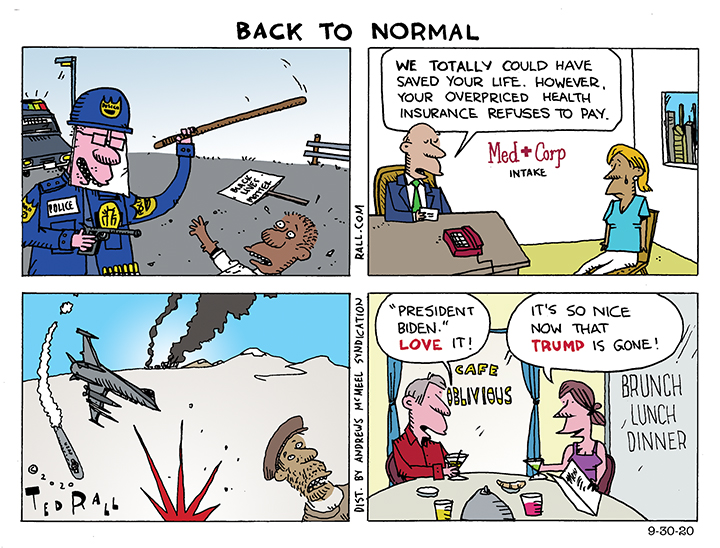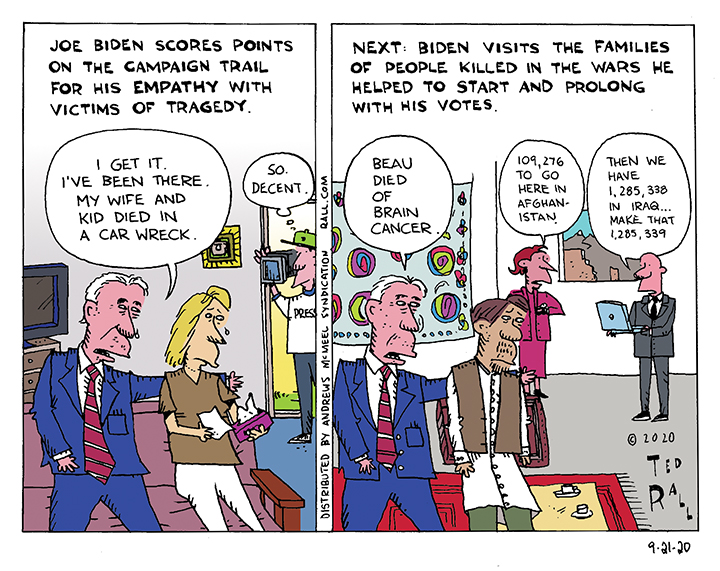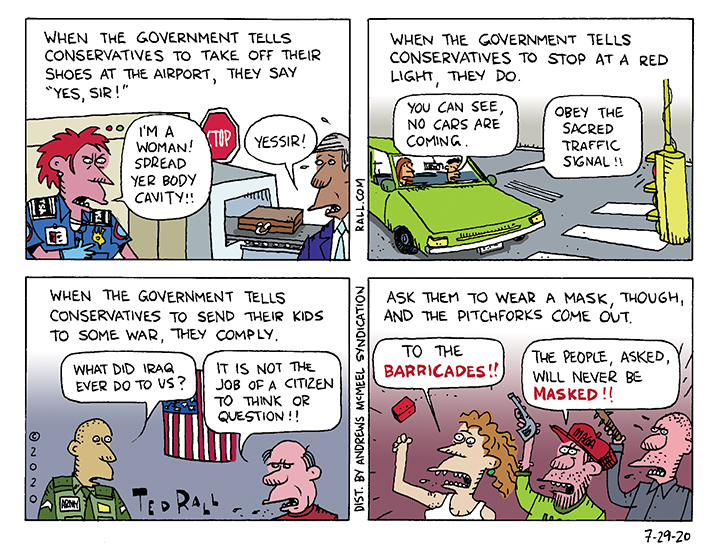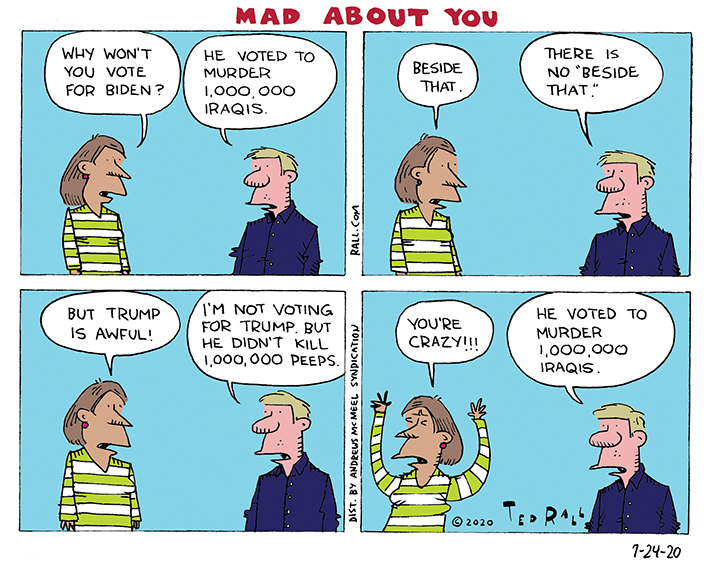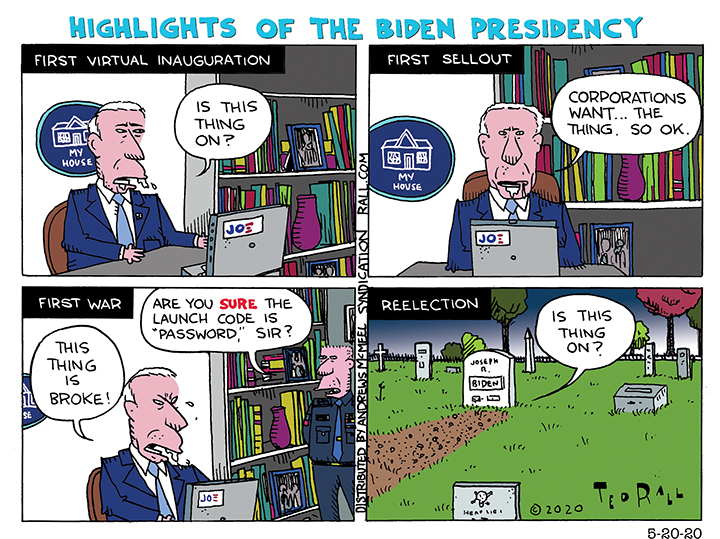One of the more persuasive arguments in favor of supporting Joe Biden is that things would go back to normal after Donald Trump leaves office. For those of us who remember what normal was, and is, that’s not necessarily appealing.
High Crimes against Journalism and Decency: Jeffrey Goldberg’s Insane “Trump Called Troops Suckers” Piece Is a New Low
Jeffrey Goldberg wrote an article for The Atlantic that could harm Donald Trump’s chance to win re-election. Setting aside the controversial content of the remarks attributed to the president, it is important to note that this is an atrocious example of journalism.
You could almost call it “fake news.”
And corporate media is taking it at face value.
You may think Trump is a turd—I do. You may want him to lose the election—I do. (I also want Biden to lose, but that’s another column.) You may believe that Trump probably said what Goldberg reports—I think there’s a good chance. But everyone who cares about journalism ought to be deeply disturbed by the nonexistent sourcing for this story and its widespread acceptance by media organizations that ought to know better.
It’s easy to see why Democratic-leaning media corporations jumped all over Goldberg’s piece: it hurts the president and it reinforces militarism. But they’re degrading journalistic standards to manipulate an election.
According to Goldberg, four anonymous sources told him that Trump called American marines who died in World War I “losers” and repeatedly questioned why anyone smart would join the military or be willing to risk their life by fighting in one of America’s wars.
Anonymous sources have their place. I have used them. But basing a news story entirely on accounts of people who are unwilling to go on the record is journalistically perilous and ethically dubious. There are exceptions, as when a Mafia source fears physical retribution.
There is no such claim here. Most media organizations’ ethical guidelines are clear: news without attribution is not news. It is gossip.
The Los Angeles Times, a publication my readers know that I hold in low regard, nevertheless takes a stance against anonymous sources. “When we use anonymous sources, it should be to convey important information to our readers. We should not use such sources to publish material that is trivial, obvious or self-serving,” the paper’s ethical standards say. “An unnamed source should have a compelling reason for insisting on anonymity, such as fear of retaliation, and we should state those reasons when they are relevant to what we publish.”
The Atlantic piece falls way short.
Likewise, writing that strips statements of necessary context is anti-ethical. Trump, writes Goldberg, “expressed contempt for the war record of the late Senator John McCain, who spent more than five years as a prisoner of the North Vietnamese. ‘He’s not a war hero,’ Trump said in 2015 while running for the Republican nomination for president. ‘I like people who weren’t captured.’” He goes on to note that Trump wanted to deny McCain the honor of lowering flags to half-mast after McCain died.
Goldberg frames Trump’s comments as part of a general bias against the military and portrays his attacks as unprovoked. Truth is, long before Trump made those comments he had been engaged in a well-documented, long-running feud with the Arizona senator. McCain based his political career on his military service and the five years he spent as a POW in Vietnam. McCain was Trump’s enemy, and there is considerable evidence that McCain—known for a sharp tongue—started the war of words. Trump gave back in kind.
“Nor did he set his campaign back by attacking the parents of Humayun Khan, an Army captain who was killed in Iraq in 2004,” Goldberg continues in another context-free passage. Khan’s father famously spoke against Trump at the 2016 Democratic National Convention. “You have sacrificed nothing and no one,” Khan said. In Trumpian terms, Khan started it. But Goldberg’s omission makes it look like Trump attacked a fallen soldier out of the blue.
Goldberg does this a third time: “When lashing out at critics, Trump often reaches for illogical and corrosive insults, and members of the Bush family have publicly opposed him.” Both sides have insulted each other; as far as the record shows, Trump is usually running offense, not defense—but Goldberg falsely portrays the enmity as a one-way street.
One of the praiseworthy aspects of this president is his relatively restrained approach to military interventionism, coupled with his willingness to directly engage adversaries like North Korea and the Taliban in Afghanistan, the latter which recently signed a peace agreement with the United States. It is logical for Trump, who is skeptical of illegal wars of choice like Afghanistan and Iraq, to question why people would volunteer to fight and possibly die in such a pointless conflict. For Goldberg, militarism is a state religion. Questioning it is intolerable.
Goldberg’s piece, the tone of which reads like the pro-war hysteria following 9/11, reflects the aggressively militaristic neoliberalism of the Democratic Party in 2020.
Goldberg references Trump’s 2017 visit to Arlington cemetery with then-Secretary of Homeland Security John Kelly. “A first lieutenant in the Marine Corps, Robert Kelly was killed in 2010 in Afghanistan … Trump, while standing by Robert Kelly’s grave, turned directly to his father and said, ‘I don’t get it. What was in it for them?’ Kelly (who declined to comment for this story) initially believed, people close to him said, that Trump was making a ham-handed reference to the selflessness of America’s all-volunteer force. But later he came to realize that Trump simply does not understand non-transactional life choices.”
Joining the military, of course, is hardly a non-transactional decision. Soldiers get paid. They get medals. They get free college. They are revered and thanked for their service. Military service gives you a leg up when you run for political office.
Moreover, Trump’s question is one Americans should be asking more often. Why would a 29-year-old man volunteer to travel to Afghanistan in order to kill the locals? No one in that country threatened the United States. No one there did us any harm. Afghans don’t want us there. Why did Robert Kelly go?
Goldberg seems obsessed with Trump’s description of fallen soldiers as suckers. “His capacious definition of sucker includes those who lose their lives in service to their country, as well as those who are taken prisoner, or are wounded in battle,” Goldberg writes. But is he wrong?
LBJ suckered us into Vietnam with the Tonkin Gulf incident, which historians of all stripes accept was a lie.
George H.W. Bush suckered us into the first Gulf War with a tale of Iraqi soldiers rampaging through a Kuwaiti hospital and pulling babies out of incubators. Another lie.
After 9/11 George W. Bush suckered us into Afghanistan by saying Osama bin Laden was there—he was not.
Of course Bush lied about Iraq having weapons of mass destruction. More suckering. (At the time, Goldberg spread the lie that Saddam Hussein was allied with his enemy Al Qaeda.)
Assuming that anything in Goldberg’s piece was true, Trump was right.
(Ted Rall (Twitter: @tedrall), the political cartoonist, columnist and graphic novelist, is the author of the biography “Political Suicide: The Fight for the Soul of the Democratic Party.” You can support Ted’s hard-hitting political cartoons and columns and see his work first by sponsoring his work on Patreon.)
Trump and Biden: Equally Awful

Front and center in the raging debate among liberals and progressives over whether they should support Joe Biden or opt out of the two-party trap by voting third-party or not at all is the assumption that Biden would do less harm both to the world and to American leftism than Trump.
Even many hard-core Bernie-or-Busters accept the premise that Biden wouldn’t be as bad as Trump. They believe the additional damage that would result from a second Trump administration is an acceptable price for teaching the DNC a lesson and building a progressive movement.
But it’s not true that Biden wins the harm mitigation sweepstakes.
For every respect in which Biden would be better than Trump—or less awful—there is a compelling counterfactual that carries equal or greater weight.
If Trump wins, for example, we can count on his uniquely toxic combination of anti-science propaganda and organizational ineptitude to unnecessarily prolong and increase the body count of COVID-19. The WHO says that millions could die in the dreaded second wave; a disproportionately high number of those people could be Americans. Let’s guesstimate half a million dead here in the U.S.?
The net cost of Trump is equal to the total number of deaths here under his second term, minus the number that would occur under Biden. Since Biden can’t do anything about the pandemic until late January when he takes office and herd immunity appears to be closer than we previously believed, whether a ridiculously incompetent Trump or a refreshingly competent Biden is president after January probably doesn’t make a big difference. There’s a chance we have seen the worst of COVID-19. Still, it’s fair to say that thousands more Americans will succumb to the coronavirus under Trump and Biden.
On the other hand, Biden is likelier to start wars than Trump and Trump is likelier to end them. Biden voted to bomb Bosnia and invade Afghanistan. He was a big cheerleader and enabler for the Iraq war. Currently he’s threatening to start a hot war with Venezuela and new cold wars against China and Russia. He also promises to keep increasing the defense budget. Donald Trump was the first American president in decades to directly negotiate with the Taliban, with whom he signed a peace agreement to bring home all American troops from our longest war.
When we assess which candidate would do the most harm, even the breathtakingly disgusting body count from COVID-19 doesn’t come close to the over 1 million people who died in the Iraq war alone. Will Biden go to war against Iran? North Korea? Anything is possible. Biden’s record is clear; he is an extremely dangerous man. And even if you don’t care about all the brown people he would kill as president, remember 9/11. Our wars come to our shores sometimes.
Despite the usual election year hysteria, there is no daylight between Trump and Biden on most major issues. Neither old white man promises to restore the $600 a week supplemental unemployment insurance. Neither is in favor of the Green New Deal. Neither wants student loan forgiveness. Neither would sign Medicare For All. Both prioritize corporations over individual citizens. Neither would significantly liberalize immigration policy.
Even on the issue of the year, police violence, Trump and Biden are competing to see which one is more palatable to the Blue Lives Matter crowd. “You know me,” Biden assured the far right in a recent speech, referencing his authorship of the notorious mass incarceration crime bill and the USA-Patriot Act that destroyed fundamental privacy rights. “You know my heart, and you know my story, my family’s story. Ask yourself: Do I look to you like a radical socialist with a soft spot for rioters? Really?” When someone tells you they are an authoritarian, believe them.
The real difference between Joe Biden and Donald Trump has nothing to do with policy. No matter which evil man wins, we are in for a lousy four years.
This election comes down to personality. How do you like your monsters? Obnoxious and buffoonish? Or polite and affable? I prefer truth in advertising: Americans are up in arms about crappy American policies precisely because Donald Trump puts an appropriately nasty face on them.
(Ted Rall (Twitter: @tedrall), the political cartoonist, columnist and graphic novelist, is the author of the biography “Political Suicide: The Fight for the Soul of the Democratic Party.” You can support Ted’s hard-hitting political cartoons and columns and see his work first by sponsoring his work on Patreon.)
Trump Tries to End the Afghanistan War, Democrats Want to Keep Killing

Pollsters have observed a consistent enthusiasm gap between supporters of President Trump and former Vice President Joe Biden. Any factor that dampens Democratic turnout could contribute to a second come-from-behind victory for the GOP.
Adding to liberal voters’ ambivalence over Biden is a rarely-discussed aspect of Trump’s presidency. Trump’s skepticism of foreign military entanglements places him to the left of mainstream Democrats like Biden. His foreign policy aligns more closely to those of the progressives who are licking their wounds from the primary defeat of Bernie Sanders—and who are considering whether or not to vote at all.
In 2016 Trump upended traditional right-wing politics by campaigning against the Iraq War—during the Republican primaries, where candidates usually compete to look tough. This year the surprise dove can take credit for extricating the U.S. from its longest war, the 18-year-old meatgrinder of Afghanistan. Not only was Trump the first post-9/11 president to hold direct talks with the Taliban, he concluded a peace deal with the insurgency that leads to a total American withdrawal by April 2021 if the Taliban uphold their commitments. Now he is even considering an accelerated timetable that would bring back the last American soldier before Election Day.
Enter the war pigs.
Trump’s peace initiative is under attack by an odd coalition of neoconservative Republicans including Rep. Liz Cheney of Wyoming and a group of Democratic hawks who inserted an amendment to the latest National Defense Authorization Act. The add-on denies the president funding to bring back the last 8,000 troops. In order to get the money the Defense Department would have to certify that pulling out would not increase the chances of Afghanistan ever becoming a safe haven for terrorists in the future. How could they promise that?
“There were elements of the progressive left and the pro-Trump right who supported these withdrawals,” Glenn Greenwald noted in The Intercept, but they lost the House fight.
Trump is no one’s idea of a pacifist. He expanded the drone assassination program he inherited from Obama and reduced its already low transparency. He supports Saudi Arabia’s vicious proxy war in Yemen. He has engaged in old-fashioned gunboat diplomacy against China.
Even so, many progressives find more to like in Trump’s willingness to engage with the leaders of countries like North Korea and Iran. Prior to Trump, high-level negotiations were positioned by the U.S. as rewards for improved behavior; Trump talks without preconditions. Progressives prefer diplomacy to war.
Biden, on the other hand, voted to bomb Serbia, invade Afghanistan and Iraq. He has never apologized—so it’s reasonable to assume he’d commit the same crimes again. He sat at Obama’s side as that administration armed and funded radical jihadis in Libya and Syria, expanding regional conflicts into all-out civil wars, one of which created the vacuum filled by ISIS. American leftists support Nicolás Maduro, a socialist, in Venezuela; Biden backs Juan Guaidó, who failed to seize power in a military coup last year. These are Hillary Clinton’s politics, an approach left-leaning voters despise.
“The liberal establishment is desperate to return a centrist to the White House in November and reestablish the country’s more stable military dominance of the world order, disrupted only briefly by Donald Trump. Joe Biden’s terrible track record on foreign policy — including his championing of war in Iraq — suggests a return to Obama-style strong military interventions abroad,” David Davison and Alex Thurston wrote recently in Jacobin.
“Biden represents the return of the classical foreign policy establishment,” Alan Minsky, executive director of Progressive Democrats of America, told The Progressive magazine. “Biden is running a campaign as a restoration candidate.”
And while Biden has made overtures to the progressive wing of his own party on such domestic issues as healthcare and the environment, he has expressed no willingness to compromise on foreign policy.
Last week a coalition of progressive groups wrote to Biden to demand that he appoint anti-interventionists to his cabinet and as top officials in the State Department. “Without national security and foreign policy personnel who are willing to learn from the mistakes of the past and understand the need for change this moment presents, we fear our country—and the world—risk descending into climate and economic chaos fueled by further corruption and authoritarianism. We expect a potential Biden administration to reflect the urgency of this moment in its personnel appointments,” the letter read.
I would not hold my breath.
(Ted Rall (Twitter: @tedrall), the political cartoonist, columnist and graphic novelist, is the author of the biography “Political Suicide: The Fight for the Soul of the Democratic Party.” You can support Ted’s hard-hitting political cartoons and columns and see his work first by sponsoring his work on Patreon.)
On Foreign Policy, Joe Biden is Worse Than Trump

Trump is terrible. Biden is just as bad. In some ways the Democrat is worse.
You shouldn’t vote for either one.
Trump is erratic and unpredictable, which is dangerous. Even so, Biden is worse than Trump on international relations.
At the center of the president’s worldview is a deep, admirable and prescient skepticism about foreign interventionism. Trump began criticizing the Iraq War soon after it began, when the U.S. invasion was still popular. His critiques continued during the 2016 primaries—have you known of another Republican to campaign against militarism? As president-elect Trump told a room full of service members: “We will stop racing to topple foreign regimes that we know nothing about, that we shouldn’t be involved with.”
Trump signed the first peace agreement with the Taliban; he plans to bring home the last American troops in Afghanistan before Election Day—even sooner than required under the deal. He refuses to be goaded into a new Cold War against Russia, has met with the leader of North Korea and has offered direct talks with Iran—positions far to the left of hawkish pro-war Democrats like Hillary Clinton, Barack Obama and Joe Biden.
Because most Americans are self-centered and unconcerned about brown people in other nations, it’s ridiculous yet necessary to remind you that the Afghans we bomb are real people like you and me, that Iraqis are scarred for life when their children are hobbled by American bullets, that Yemenis cry for their dead blown to bits by American missiles, that our insane decision to turn Libya from the most prosperous country in Africa into a failed state with 21st century slave auctions is an atrocity, that we have murdered hundreds of thousands of innocent people in the last couple of decades for no reason that can be justified under common sense or international law.
The United States is the greatest exporter of death, oppression and exploitation on the planet. Every human being has the duty to oppose it. We who pour our taxes into the U.S. government have the biggest duty of all to fight the war machine. That begins with holding the murderers and their enablers accountable for their—there is no better word—evil.
Wars of choice are not horrors of happenstance, like a tornado. Political leaders vote to slaughter and maim men, women and children and ruin economies around the globe, leading to still more death. Some politicians are especially nefarious, convincing other politicians to vote for mass murder.
Politicians like Joe Biden.
Most recently, after Trump signaled his willingness to dump U.S.-backed rightist Juan Guaidó and meet with Venezuelan president Nicolás Maduro, a socialist, Biden called Maduro a “dictator” and pledged fealty to right-wing Venezuelan exiles in South Florida. It was the latest in a long line of foreign policy calls that we have come to expect from a right-wing Republican like George W. Bush—yet Biden plays a “Democrat” on TV.
“He’s registered some antiwar positions from time to time, as when he voted against the first Gulf War or opposed the funding of the Nicaraguan contras in the 1980s. But overall, he’s racked up a track record of supporting overseas adventures,” observed Branko Marcetic, writing for Jacobin.
Biden, notes Marcetic, pushed for “the 1999 bombing of Serbia, which actually dissolved the local pro-democracy movement and rallied popular support around the country’s dictator.” Biden voted for the U.S. wars against Afghanistan and Iraq. “I voted to go into Iraq, and I’d vote to do it again,” Biden said in August 2003. Now he defends himself by saying he was so stupid that he fell for Bush’s lies about WMDs.
Biden was the guy who convinced Obama to ramp up Bush’s drone assassination program, which kills 50 innocent bystanders for every 1 targeted “militant”—who often gets away and is rarely a threat to the United States, just to our authoritarian allies. Someday soon Biden’s drone killings abroad will be used to justify killing Americans here at home.
Elsewhere Marcetic writes: “When Reagan invaded Grenada in 1983, bombing a hospital in the process, Biden said he ‘did the right thing.’ When he bombed Libya three years later, killing 36 civilians and dictator Muammar Gaddafi’s 15-month-old daughter, Biden said, ‘There can be no question that Gaddafi has asked for and deserves a strong response like this.’ And when George H. W. Bush invaded Panama three years after that, an outrageous war to depose a leader who had been a CIA asset and that saw dead civilians ‘buried like dogs,’ as one witness put it, Biden called it ‘appropriate and necessary.’”
A vote for Biden isn’t just a vote against Trump. It’s a vote in favor of Biden’s vote to kill one million Iraqis. If we elect Joe Biden, we will send a message to the world: America hates you, we’re glad we killed all those people and we plan to kill more.
It will also send a message to Biden: Heckuva job, Joe!
(Ted Rall (Twitter: @tedrall), the political cartoonist, columnist and graphic novelist, is the author of the biography “Political Suicide: The Fight for the Soul of the Democratic Party.” You can support Ted’s hard-hitting political cartoons and columns and see his work first by sponsoring his work on Patreon.)

